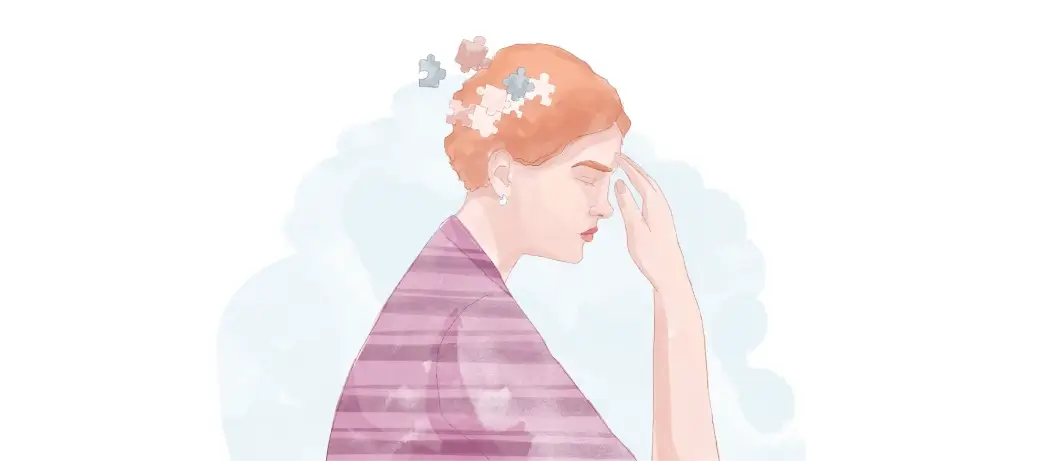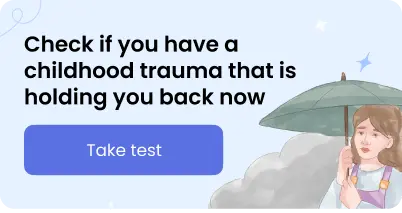Trauma can bury our memories so deeply in our minds that we can not recall them. Most of the time, it can be a sign of dissociative amnesia.
It is not amnesia to forget things like where you put your keys or the name of someone you have met twice. It’s rather not being able to remember certain traumatic events or even all of life’s events.
In this comprehensive guide, we will explore this puzzling mental health condition, its intricacies, and the telltale signs that could indicate its presence in your life.
What do the terms dissociation and amnesia mean?
Before talking about dissociative amnesia, let’s break this definition and look closer at both terms separately: dissociation and amnesia.
Dissociation is commonly seen as a mental process that causes a lack of connection between a person’s thoughts, memory, and sense of identity. This state of separation from reality can feel like an out-of-body experience, where a person may perceive the environment from a detached perspective.
It is important to tell the difference between mild dissociation that happens from time to time, like daydreaming, and more intense dissociative disorder experiences that can really affect a person’s life or mental health. Typically, this occurs after a person goes through some traumatic event.
What is amnesia? Amnesia refers to a partial or total loss of memory. It can happen in the context of a single event or be more extensive, affecting periods of time.
Amnesia can be quite a selective memory process. People who have it can not remember certain details or events, but they can remember other things that happened in their lives.
It is time to talk more about what dissociative amnesia means now that we know what both terms mean.
Understanding dissociative amnesia
Imagine waking up one morning with no recollection of who you are, where you are, or the people around you. Such a scenario, while frightening, is a reality for someone who may experience dissociative amnesia because of trauma.
Dissociative amnesia is a condition in which a person is unable to recall important personal information or life events.
Often, they can’t remember their childhood (starting at 3 years old) and teenage years. It is typically associated with a traumatic event that is too distressing to remember consciously.
For example, people sometimes ask themselves, “Why can’t I remember my childhood?” Also, they can ask, “Why do I not feel like myself?”
Somehow, this mental effect separates memories from consciousness, hiding past events. It’s like a protective blind spot in our psyche that obscures memories to prevent overwhelming emotional distress.
Often, dissociative amnesia is seen as one of several dissociative disorders in which a person forgets important parts of their life and can not fully understand who they are or what they are going through. Other dissociative disorders are depersonalization and derealization.
On average, 1.8% of people in the US are diagnosed with dissociative amnesia every year. But how does this defensive mechanism come into play, and what does it look like in real life?

The brain’s role in memory formation and disruption
Memories are complex creations of our brain, and their formation and retrieval engage many neural pathways in things remembered locations.
For example, the hippocampus, known as the memory center of the brain, is essential for encoding new information into memories.
However, when someone experiences a traumatic event, their brain’s normal memory network gets tangled up with their fear responses. This could change how they remember things.
Dissociative amnesia vs. retrograde amnesia
Although both dissociative amnesia and retrograde amnesia cause people to memory loss, they are very different in their causes, effects, and ways of treating them.
So, what is the major difference between dissociative amnesia and retrograde amnesia?
Dissociative amnesia is usually caused by mental stress or trauma. It is the mind’s way of protecting the person from emotional pain. People who have been through a traumatic event may forget personal details or memories of certain times in their lives.
If you have dissociative amnesia, you tend to lose your personal memories more than any other kind of memory loss. Interestingly, it does not usually affect your general knowledge or skills.
Conversely, retrograde amnesia usually happens after a brain injury, like a blow to the head or some brain diseases. It erases memories that were formed before the amnesia starts. So, the person can not remember things from the past, personal experiences, or even who certain people are.
Notably, though, the ability to make new memories in retrograde amnesia stays the same, which shows an interesting aspect of how memory works.
Types of dissociative amnesia
Different people with this amnesia have different levels and types of the condition. Here are the recognized subtypes of dissociative amnesia:
Localized amnesia
In localized amnesia, the loss of memory is specific to a particular event, series of events, or a specific time frame. It is common for this type to happen after a very traumatic event, and the person may not be able to remember anything about it or the time it happened. This is the most common type.
Selective amnesia
With selective amnesia, you can recall most of your past but experience memory gaps surrounding specific details or events. These gaps are often related to traumatic memories that the person has difficulty recalling and addressing.
Generalized amnesia
The most severe form, generalized amnesia, involves a complete loss of memory that lasts a person’s whole life. In this case, personal identity and biographical information fade, making it very hard for the person to go about their daily life.
Causes of dissociative amnesia
What precipitates dissociative amnesia is often deeply rooted in what happened in the past. Commonly, dissociative amnesia is caused by traumatic events in the past. That’s why we might ask ourselves, “Do I have trauma I don’t remember?”
The role of childhood trauma in dissociative amnesia
The sections of our brain responsible for memory are incredibly sensitive to the impact of traumatic experiences, especially in childhood when the brain is still developing.
For instance, researchers have found that early-life trauma can create a big impact. Childhood trauma (C-PTSD) not only distorts the immediate perception of the event but also potentially reshapes the child’s developing brain in a way that alters its response to future stressors.
When a traumatic experience overwhelms a child’s ability to cope, dissociation can occur. All of this can make it harder to make new memories right away and cause dissociative amnesia over time as a way to protect their mental health.

Other possible reasons
- Trauma and Stress: Beyond the common stresses of daily life, extreme stressors such as war, natural disasters, and severe personal conflict can trigger dissociative amnesia.
- Medical Conditions: While rare, certain medical conditions such as epilepsy or Alzheimer’s disease can also lead to dissociative amnesia.
- Substance Misuse Disorder: Chronic substance misuse, particularly of alcohol and illicit drugs, may contribute to the development of dissociative amnesia in some cases.
Recognizing the signs and symptoms of dissociative amnesia
Identifying this type of amnesia in its early stages is vital for effective intervention and treatment. The following symptoms are listed in the DSM-5 for dissociative amnesia:
Memory lapses and gaps
The most apparent symptom is unexplained gaps in one’s memory—periods of time unaccounted for, episodes of forgetfulness that extend beyond mere absent-mindedness. After a while, the person might not remember important things like birthdays, milestones, or some details from childhood.
Identity confusion
This kind of amnesia can make a person very confused about who they are, what they are here for, and where they belong in the world. They might change who they are or give different versions of their life stories, which can cause identity crises that affect every part of their lives.
Confusion and disorientation
Those with dissociative amnesia might appear bewildered and disoriented, struggling to make sense of their current situation and environment.
False memories
Some people try to fill in the blanks in their memories by making up memories that seem real, which can cause more confusion and stress.
Impaired Functioning
Day-to-day activities may be severely disrupted as a result of the amnesic episodes, affecting work, school, and social life.
Living with dissociative amnesia
If you have dissociative amnesia, your memory might look like a jigsaw puzzle. When memories are gone, everyday life turns into a challenge and a battleground against an enemy that can not be seen.
Here are some things that might help with dissociative amnesia:
- Therapy: Therapy for dissociative amnesia is multifaceted and often involves techniques from cognitive-behavioral therapy, dialectical behavior therapy, and eye movement desensitization and reprocessing (EMDR). The goal is not only to recover memories but also to reframe them so that the person can have a functional, fulfilling life.
- Building a support system: You can not heal by yourself. Therapists, friends, and family who understand how hard it is to deal with dissociative amnesia are important parts of a strong support network.
- Practice self-care: In the face of dissociative or amnesic experiences, taking care of oneself becomes all the more important. Maintaining a healthy lifestyle, doing self-care activities on a regular basis, and sticking to a routine can help with mental health and stability.
Myths&facts about dissociative amnesia
The best way to help people understand and support those who have amnesia is to get rid of myths and false information about it.
Myths:
- Recovered memories are always true: Recovered memories may be accurate, but they could also be reconstructed or influenced by suggestion.
- All cases of memory loss are dissociative amnesia: Memory loss can stem from various causes, not just dissociative amnesia. It can also be childhood amnesia, for example.
- Amnesia is always unitary and extreme: Amnesic gaps can vary in severity, duration, and the amount of an owner’s past they cover.
Facts:
- It’s not just about memory: Amnesia can affect a person’s identity, sense of self, and perception of the world.
- It’s treatable: With appropriate support and treatment, people who have dissociative amnesia can experience significant improvement and even full recovery.
- It’s complex: Multiple genetic, neurobiological, and environmental factors often work together to cause this condition.
Disclaimer
This article is for general informative and self-discovery purposes only. It should not replace expert guidance from professionals.
Any action you take in response to the information in this article, whether directly or indirectly, is solely your responsibility and is done at your own risk. Breeze content team and its mental health experts disclaim any liability, loss, or risk, personal, professional, or otherwise, which may result from the use and/or application of any content.
Always consult your doctor or other certified health practitioner with any medical questions or concerns
Breeze articles exclusively cite trusted sources, such as academic research institutions and medical associations, including research and studies from PubMed, ResearchGate, or similar databases. Examine our subject-matter editors and editorial process to see how we verify facts and maintain the accuracy, reliability, and trustworthiness of our material.
Was this article helpful?




